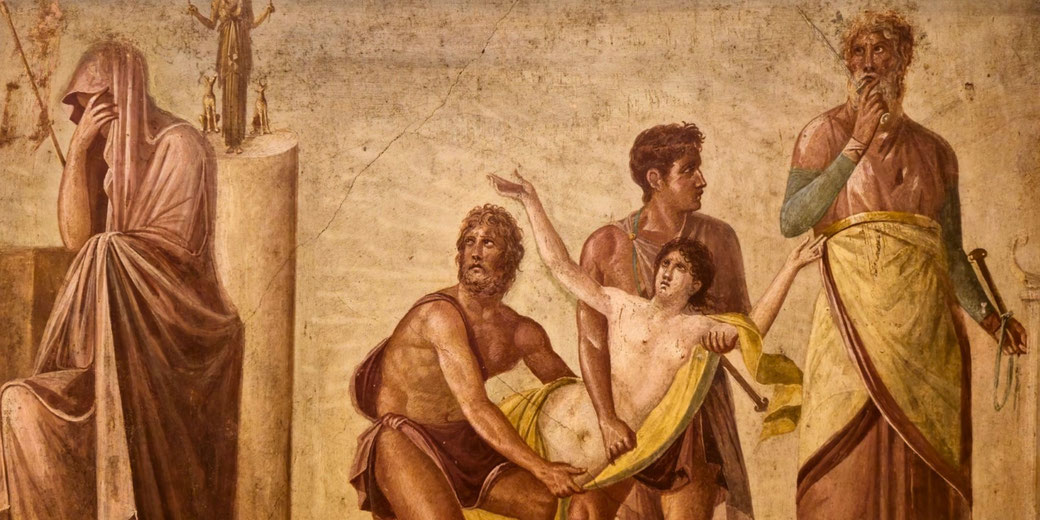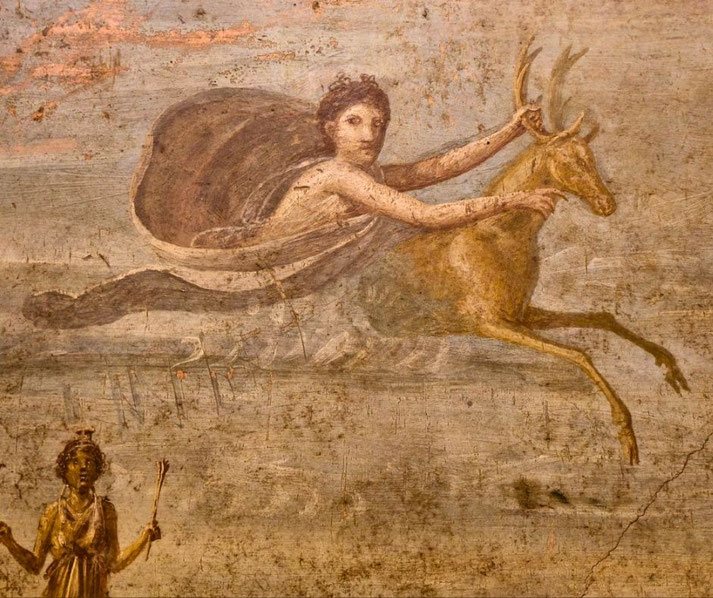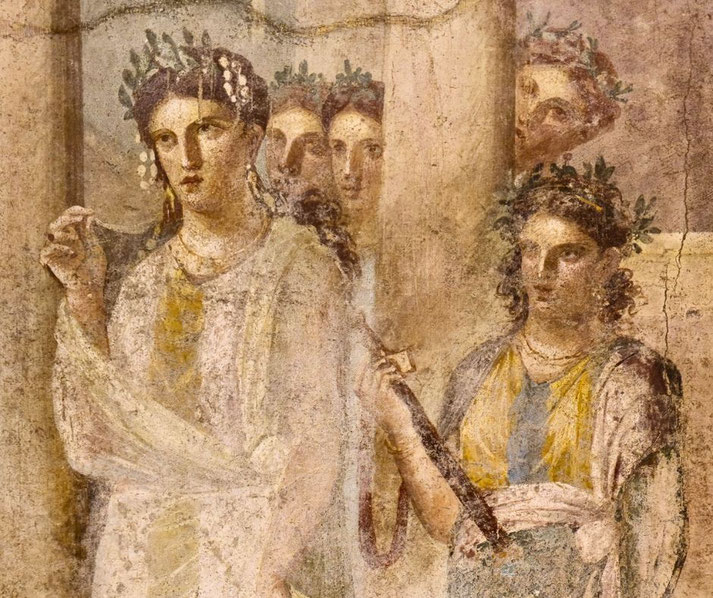The tragic murder of the young girl Iphigenia: Human sacrifice in Ancient Greece

Among the uncomfortable and bizarre stories in Ancient Greek mythology, there is one that is particularly disturbing: the story of Iphigenia.
She was the daughter of Agamemnon, one of the most important leaders of the Greek forces in the Trojan War. Due to his own arrogance, he had to choose between his military duty and his own family.
Sadly, her fate would become a central to ancient Greek morality.
The terrible curse on the House of Atreus
Long before Iphigenia was even born, her family was caught up in a tragic series of events.
She would be part of the House of Atreus, which was one of the most infamous families in Greek mythology.
It had a bloody history and a terrible curse that began with Tantalus, the progenitor of the house.
In another myth, he committed an unforgivable crime by killing his son Pelops and serving him as a meal to the gods.
Horrified by this act, the gods restored Pelops to life and condemned Tantalus to eternal suffering in the Underworld.
Over the generations, the curse continued to manifest in various tragic events that plagued the descendants of Tantalus.
Atreus, the grandson of Tantalus and father of Agamemnon and Menelaus, continued the curse by feuding with his brother Thyestes.
To seek revenge for a past betrayal, Atreus murdered Thyestes' sons and served them to their father at a banquet.
As a result, the gods again punished the House of Atreus with “endless strife and misfortune”, a curse that would be extended to all its descendants.
When Iphigenia was born, she was the daughter of Agamemnon, the powerful king of Mycenae, and Clytemnestra, a daughter of Tyndareus, king of Sparta, and Leda.
The young princess, therefore, belonged to two of the most influential royal houses in ancient Greece.
Because of her royal birth, she was destined to be involved in the complex world of Greek politics.
As a princess of Mycenae, she lived in a world dominated by expectations and duties.
Through her mother's side, she was also connected to Helen, whose abduction would spark the Trojan War.
This link to Helen foreshadowed Iphigenia's own tragic role in the events leading up to the Greek expedition to Troy.
Agamemnon and the start of the Trojan War
According to myth, the Trojan War began with a quarrel among the goddesses Hera, Athena, and Aphrodite, who asked Paris, the prince of Troy, to judge who was the fairest.
Paris awarded the prize to Aphrodite, who promised him the most beautiful woman in the world, Helen of Sparta.
Helen's abduction by Paris, however, was an affront to the honor of her husband, Menelaus, the brother of Agamemnon.
To ensure a strong coalition, Agamemnon invoked the oath sworn by Helen's former suitors, who had pledged to defend her marriage, making them honor-bound to join the expedition.
Since he was the king of Mycenae and a powerful leader in Greece, Agamemnon took it upon himself to rally the Greek forces to launch a campaign against Troy and reclaim his brother's wife.
To this end, the ships from the various Greek city-states gathered as a fleet at the bay of Aulis.
However, it was quickly realized that the fleet could not sail for Troy due to strangely unfavorable conditions.
How Agamemnon offended the gods
The ships were trapped in the harbor of Aulis due to a lack of wind. To explain why the winds did not change for days at a time, the mystical seer Calchas declared that the poor weather was the result of Agamemnon's offense against the goddess Artemis.
As the Greek forces had been gathering at Aulis, Agamemnon had gone on a hunting expedition.
During it, he killed a sacred deer that belonged to Artemis, the goddess of the hunt and wild animals.
Agamemnon had further compounded his crime by boasting that he was a better hunter than the goddess.

Because of this, Artemis decided to exact a severe penalty on Agamemnon and the Greek forces.
She caused the winds to cease, leaving the Greek fleet stranded at Aulis and unable to begin their voyage to Troy.
To the Greeks, the sudden and prolonged calm was an unmistakable sign of divine displeasure.
Calchas then revealed that Artemis demanded a sacrifice to atone for Agamemnon’s offense.
The price was high—Artemis required the life of Agamemnon’s eldest daughter, Iphigenia.
For Agamemnon, this demand created an excruciating dilemma, pitting his duty as a father against his responsibility as a leader of the Greek forces.
The sacrifice of Iphigenia
In desperation, Agamemnon agreed to the sacrifice, setting in motion a tragic chain of events.
In his mind, he could not escape the legacy of his ancestors. The curse seemed to dictate that he, like his forebears, would cause suffering within his own family.
To lure Iphigenia to Aulis, he deceived his wife, Clytemnestra, by telling her that their daughter was to marry Achilles, the greatest warrior of the Greek army.
Clytemnestra, completely unaware of the true purpose of the summons, traveled to Aulis with Iphigenia, believing she was attending a joyous wedding.
Upon discovering the real intent, she pleaded with Agamemnon to spare their daughter, but her cries fell on deaf ears.
The warriors, who were restless and frustrated by the delay, believed the sacrifice would finally bring favorable winds and ensure the gods’ favor in their endeavor against Troy.
Iphigenia, realizing the fate that awaited her, is said to have faced her impending death with stoic resolve.
She understood that her sacrifice was necessary to enable the Greek fleet to sail and chose to accept her fate to save her people and uphold her father's honor.
Surrounded by Greek soldiers and priests, Iphigenia was prepared for the sacrifice.
The priests carried out the ritual, and as Iphigenia lay on the altar, her life was taken.
Her death was swift and, once completed, the winds returned. The Greek fleet to finally set sail for Troy.
Why did the Greeks love retelling this story?
The myth of Iphigenia became a popular moral tale of the mix between fate, duty, and sacrifice in everybody’s life.
The great tragic poets of classical Athens, which include Aeschylus, Sophocles, and Euripides, each presented her story with unique perspectives that reflected their different styles and concerns.
Aeschylus referenced Iphigenia in his trilogy, the Oresteia, written around 458 BCE, as part of the broader curse that plagued the House of Atreus.
His portrayal focused more on the ramifications of her sacrifice for her family and the cycle of vengeance it perpetuated.
Sophocles, who wrote later in the 5th century BCE, put less emphasis on her individual experience and more on the collective tragedy of her family.
Euripides, however, devoted two plays to her, Iphigenia in Aulis and Iphigenia in Tauris, both of which explored her character in greater depth and presented her as a central figure caught in the tragic machinations of the gods and men.
What is interesting, is that the portrayal of Iphigenia varied significantly across these works.
In Aeschylus's narrative, she appeared as a passive victim: her fate sealed by the sins of her forefathers and the demands of the gods.
The focus remained on her father's guilt and the moral dilemmas faced by those around her.
In contrast, Euripides offered a more nuanced depiction of Iphigenia, particularly in Iphigenia in Aulis, where she evolved from a frightened girl to a courageous figure highlighted themes of duty and self-sacrifice.
Nevertheless, the themes of sacrifice, duty, and family loyalty dominated the narratives of Iphigenia’s story.
It reveled in the moral and ethical complexities faced by ancient Greeks. In particular, her willing acceptance of death was praised as the epitome of the virtue of self-sacrifice.
In each version, her willingness to die for the greater good of her people raised questions about the nature of sacrifice and the demands of public duty.
Iphigenia in Tauris: Did Iphigenia actually survive?
In Euripides' Iphigenia in Tauris, the story of Iphigenia took an unexpected turn after her supposed sacrifice at Aulis.
Instead of dying at the altar, at the last moment, Artemis took pity on the young girl and replaced her with a deer.
Iphigenia was then whisked away to the distant land of Tauris. There, she served as a priestess in the temple of Artemis, presiding over the ritual sacrifices of foreigners.
This new role placed her in a land far from home, where she faced the grim task of preparing others for a fate she had narrowly escaped.
For years, Iphigenia lived under the shadow of despair, believing her family had forgotten her.
In Tauris, her fate intertwined with that of her brother, Orestes, who arrived with his companion Pylades, seeking the sacred statue of Artemis.
Unbeknownst to Iphigenia, Orestes had come on a mission to atone for the murder of their mother, Clytemnestra, and to appease the gods who tormented him with the Furies.

The themes of redemption, forgiveness, and reunion emerged powerfully in this play, offering a different perspective on the tragic events that had befallen the House of Atreus.
Euripides explored the possibility of reconciliation between family members torn apart by betrayal and violence.
Iphigenia, initially unaware of her brother's identity, prepared to sacrifice Orestes, following the brutal customs of Tauris.
Thanks to a dramatic revelation, she recognized him, and the siblings experienced a profound moment of forgiveness.
At that moment, the play shifted from a tale of despair to one of hope and renewal.
Together, Iphigenia and Orestes devised a plan to escape from Tauris with the statue of Artemis, seeking a return to their homeland and a fresh start.
For both, the journey back to Greece represented an opportunity to restore their shattered family and find peace.
By Euripides' hand, the reunion of brother and sister became a moment of catharsis, where old wounds began to heal.
The story of Iphigenia in Tauris, therefore, offered a different ending—one that allowed for the possibility of forgiveness and the hope of a better future.
What do you need help with?
Download ready-to-use digital learning resources
Copyright © History Skills 2014-2025.
Contact via email
With the exception of links to external sites, some historical sources and extracts from specific publications, all content on this website is copyrighted by History Skills. This content may not be copied, republished or redistributed without written permission from the website creator. Please use the Contact page to obtain relevant permission.





